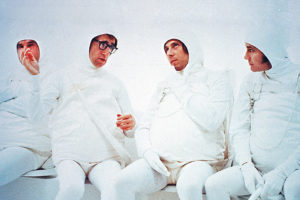One of the greatest threats to familial harmony in the 21st century is the home DNA test. Stories of psychological devastation abound, from finding out your father isn’t your real father to discovering the imminence of a terrible disease. Perhaps you’ll discover you have an unusually high proportion of Neanderthal DNA, to the great annoyance of your spouse; or maybe you’ll even find out you’re related to a serial killer. In France, private commercial testing has been banned since 2005 in order to “preserve the peace of families” — perhaps not surprising when you also remember that 38% of French women admit to cheating on their partners.
But if, despite all the risks, you find yourself positively longing to find lost genetic relatives, a testing kit may be the way to go. This week, the UK’s Human Fertilisation and Embryo Authority has recommended that the identities of sperm and egg donors be made knowable to recipients from birth, on the grounds that the widespread use of home DNA test kits has made attempts to preserve donor anonymity futile in any case.
Under current law, a donor-conceived young person turning 16 gains the right to discover the height, weight, eye and hair colour of the person who contributed at least half of her genetic material, along with generalised information about ethnicity, marital status, and the number of other children, if available. Only at 18 are clinics permitted to send out information about a donor’s full identity — name, date of birth, and last known address. But in the meantime, databases can be used to track down close genetic relatives by comparing your DNA results with those of others. There are several Facebook groups and non-profit “search angel” agencies that will help, leading in many cases to identification of donors for those who want to know.
On a cynical reading, the popularity of such kits is yet another reflection of our narcissistic culture and its obsession with identity — understood as something socially marketable that elevates you into desirably select company and away from the common herd. Certainly, across the political spectrum there are those who take DNA results as implying something positively fascinating about them as individuals, whether this involves celebrating the discovery of supposedly pure white ancestry or thrilling to the thought of unknown distant Jewish forebears. But in another more basic sense of “identity” — meaning one’s private sense of self — testing clearly offers hugely significant information about immediate biological origins to those who lack it.
Granted, within philosophical theories of personal identity, there is a tendency to favour a certain configuration of qualitative psychological aspects as the definitive factor, rather than prioritising the biological make-up of a particular human organism. (John Locke, for instance, thought that personal identity was determined by continuity of memories — according to him, complete amnesia made you a whole new person.) But even if identity in this fundamental sense is determined by psychological not biological factors, the fact remains that beliefs about your birth parents usually make a big difference to your psychology. In a recent survey of donor-conceived people, 85% reported a shift in their “sense of self” upon learning of their origins, and about half “sought psychological help in order to cope”. Nearly 74% said that they “often or very often” thought about the nature of their conception.
It’s really not hard to understand why that might be. Indeed, you might assume that the rise in the popularity of home DNA testing has proved the final nail in the coffin for the myth that people can be socialised into total indifference about immediate genetic forebears. For a long time now, academics in the humanities have been churning out arguments to undermine the importance of bloodlines — whether that’s by ideologically prioritising nurture over nature and ignoring potential genetic confound; mounting pejorative attacks on the spectre of “biological essentialism”; or arguing, with stunning post-structuralist chutzpah, that biology generally is a socially constructed fiction. But still, in practice, most people have remained stubbornly immune to this intellectual pressure.
In a society obsessed with building hierarchies of suffering, there can sometimes also be a suspicion that, should you mention the psychological importance of knowing about your immediate origins, you are somehow discriminating against anyone who lacks such knowledge. More generally there is distaste for ever defining any aspect of family in terms of biological connection, for fear of hurting those orphans, adoptees, or donor-conceived people who don’t know much about theirs.
The preferred argumentative move here seems to be: take something traditionally defined in terms of a biological role (in this case, the concept of a parent); identify some socially important activities that tend to accompany that role (for instance: caring, nurturing, defending a child from harm, and so on); then hive those activities off conceptually from the biological substrata, and redefine the original concept in terms of the social stuff alone. This argument works much better for the concept of “parent” than it does for the much-discussed concept of “woman” — partly because parenting is an activity but “womaning” is not. Even so, agreeing that parenting should be understood as a mainly social relationship should not stop us insisting that facts about biological kinship rightly retain great meaning for people.
The fertility sector seems to be in bad faith about this point, indirectly acknowledging the importance of biological ties when it comes to regulating information about donors, while continuing to try to break humans up for their reproductive parts wherever there’s adult demand for it. In March, for instance, the Law Commission of England and Wales and the Scottish Law Commission recommended that a surrogate mother — including one who has contributed her own egg to her own pregnancy — should no longer automatically count as the resultant baby’s legal mother. It also suggested that she be given reduced time after birth to change her mind.
Yet at the very same time, it was proposed that a new “Surrogacy Register” be built, in order “to add greater transparency and give children born through surrogacy the opportunity to trace their origins when they are older”. In this, the Law Commissions follow a general trend in the modern-day fertility industry: make it easier for a newborn to have no meaningful relationship at all with her biological family while still insisting that one day she must be able to know who they are and where they live.
But uncomfortable as it may be for some to admit, the strong desires of many donor-conceived children to get information about genetic parents cannot be surgically detached from their emotional wish to have a meaningful relationship with biological family members that goes well beyond the bare registering of names and addresses. By the time a donor-conceived person gets information about her genetic background, a real relationship may be impossible for several reasons — but that doesn’t make its absence any the less a source of sadness for many. The psychotherapeutic literature contains much reflection about how a therapist might work with a client in order to mitigate such a great personal loss.
No doubt such an experience is not the case for everybody — but still, it is for many. And it’s also possible that restricted amounts of information about a donor’s identity may feel worse for some people than nothing at all. Scrolling through a Facebook photo album of happy strangers who happen to be your own biological family appears a potentially desolate and alienating prospect, to say the least.
Recognition of the value of real connection with your genetic family is also implicit in several responses to the HFEA’s public consultation on donor anonymity, which notes that information about half-siblings is often just as longed for by a donor-conceived person as information about a missing biological parent. Equally, if there were no widespread desire for a relationship in the first place, it would be hard to understand why fertility clinics encourage donors to write a “goodwill message” to give to “any potential children” when they are of an age to receive it.
To take such ordinary and familiar human longings seriously would force us to confront why society is increasingly signing off on the production of infants — from scratch, as it were — in ways designed to cut them off from future meaningful connection to their biological roots. We might even have to push back collectively against flashy lobbying groups who, with the help of heartrending stories about adult infertility, present reproduction via someone else’s genetic material as a right, and who apparently could not care less about the finer details of what this might mean for the emotional lives of children afterwards. But since we can’t apparently do any of this with much conviction, it will be easier for many to carry on pretending that who you come from, exactly, doesn’t matter — even as we make new laws insisting that you must always be allowed to find out.
Disclaimer
Some of the posts we share are controversial and we do not necessarily agree with them in the whole extend. Sometimes we agree with the content or part of it but we do not agree with the narration or language. Nevertheless we find them somehow interesting, valuable and/or informative or we share them, because we strongly believe in freedom of speech, free press and journalism. We strongly encourage you to have a critical approach to all the content, do your own research and analysis to build your own opinion.
We would be glad to have your feedback.
Source: UnHerd Read the original article here: https://unherd.com/




